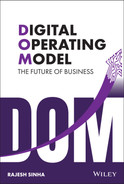Epilogue
Why DOM: The Future of Business Is Your Game Changer
I have spent three decades developing my expertise as a consulting professional—an IT doctor who specializes in business transformation via digital pathways.
I've dealt with all sizes of business and across various industries from the United States and Latin America to the United Kingdom, Europe, India, Middle East, and Australia. And, I know that what works in one company does not work in others as well as what works for one country does not work for others. I've recruited more than 10,000 people in multiple countries and understand the work culture of different parts of the world. I'm not just a consultant either. I and my company have been part of putting together business platforms that help companies generate exponential growth stories.
From that experience, I've identified the common denominators for success. They include the importance of thorough assessments and road maps—As Is and To Be—as discussed throughout this book. Having met thousands of CEOs, the most successful have a growth mindset and are willing to learn and change, too. Hence, the future is about agility and adoption.
Over the years I've also seen more companies fail at achieving digital maturity than succeed. Also as discussed in these pages, it's not about the technology, but rather the people involved. Those who strive for fewer mistakes—who learn from others' past mistakes—are the most successful.
After immersing myself in so many complex situations as an IT doctor, I find simplicity in solving the problems. One size does not fit all, but one approach does solve most problems. When someone is sick, a medical professional assesses the situation, then prescribes a solution.
The future of work is more preventive than prescriptive. In the past, management consultants offered prescriptive solutions—bandage solutions. In our digital age, solutions are more preventative in nature.
Thoughts on the Future of Business
- To solve problems: We must approach them as a doctor does an ailing patient—assess the problem, then come up with solutions.
- In the education sector: After working with more than 100 universities worldwide, I've learned that all want to teach a relevant curriculum with good professors and deliver exceptional student experience. Why then does each have its own unique and complex IT system? Perhaps there should be one system in the future called “One University System.” Everyone can customize it instead of building their platforms.
- In the food industry: Food suppliers and manufacturers in schools, universities, hospitals, assisted-living facilities, corporations, events, and restaurants all require ingredients, recipes, menus, and staff. All the food products' nutrition and ingredients are standard. An egg is high in protein; therefore, it's usually used to provide protein in a meal. Why isn't there one global system with all products and their nutrient information that is shared as an ecosystem in the same way airlines maintain flight prices in a centralized system of Sabre and Amadeus?
- In the fintech payments space: Digital payments are inevitable, so why don't all countries use a common business platform instead of building separate systems for each government and each industry? It requires extensive customization, but one can reuse the 50% from the out-of-the-box platform.
- In the insurance sector: Data play a vital role in the future of the insurance industry. Why isn't there one platform for data science needs that all companies can tap into, again like the airline industry with Sabre and Amadeus?
- On the manufacturing sector: Why does everyone create their own products inventory system when it's possible to have a common system?
- On the preventative versus prescriptive approach to business wellness: So many consumers today opt to embrace wellness, diet, and exercise to stay healthy instead of getting sick and popping pills as the solution. Similarly in business, the journey to digital maturity begins with the digital operating model as your guide and is the preventative pathway to avoid disruption and to remain relevant and purposeful today and into the future.
- On the digital platform: The business platform enables companies to deliver their unique customer experiences and fulfills the purposeful promise of making life easier and better for everyone.
LAST WORDS FOR NOW
Life should be like a flowing river, not a stagnant pond. Along the river we bump into big stones and learn to avoid them while the small stones we pick up and enjoy along the way. The river continuously flows, branches into canals, and merges into the oceans. On the journey it serves many purposes—from creating fertile lands to providing sustenance, transportation routes, and making life better for those around it.
Successful businesses are like the river, and digital transformation the pathway for a company to become relevant now and into the future. When a business connects purpose with profits, everyone benefits.
